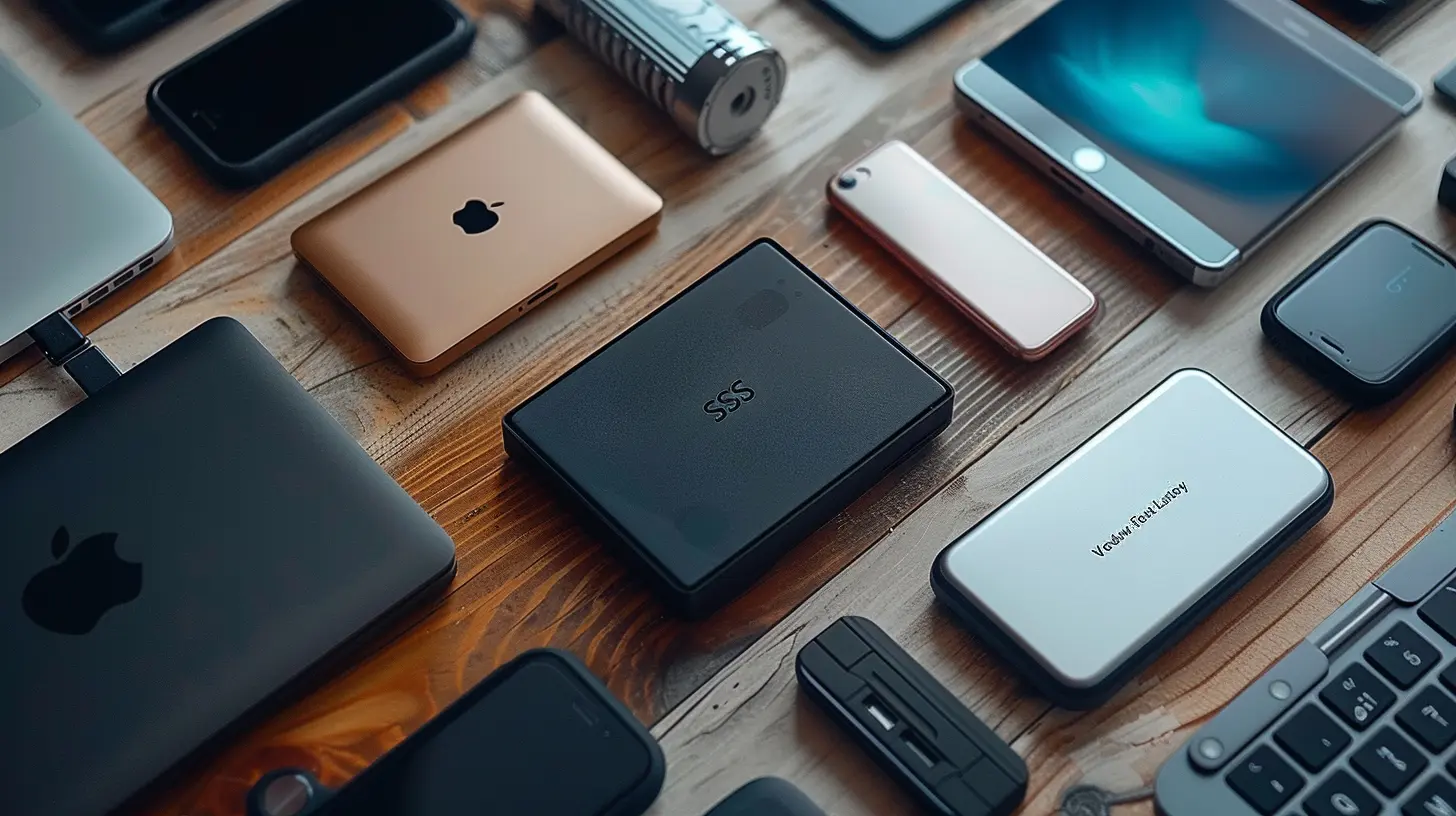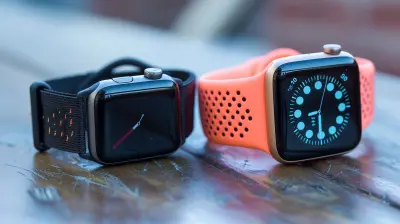Portable Hard Drives vs. SSDs: Which is Best for You?
14 October 2025
We’ve all been there—staring at that warning that says “Storage Full.” Whether you're a college student managing massive project files, a content creator with gigs of videos, or just someone with a love for hoarding digital memories, portable storage is your best friend.
But here's the big question: Should you go with a portable hard drive or a solid-state drive (SSD)?
Let’s not sugarcoat it—this choice can be overwhelming if you’re not entirely sure what you're looking for. There are differences in speed, cost, durability, and more. So, let’s break it all down in plain English and help you figure out which one fits your lifestyle.
What Exactly Are Portable Hard Drives and SSDs?
Let’s keep this simple.Portable Hard Drives (HDDs)
A portable hard drive is like the old-school record player of storage. It's got moving parts—a spinning disk and a read/write arm. Think of it like a mechanical library where the arm reads the data from the spinning book of disks.They’ve been around for decades, and for a good reason: they’re spacious and usually pretty cheap.
Solid-State Drives (SSDs)
Now, SSDs? They’re like the flash drives on steroids. No moving parts, just pure, fast storage. Think of it like a lightning-fast memory chip that stores your data digitally. It’s compact, durable, and speeds through tasks like it’s late for a date.
Speed: Who’s Winning the Race?
Let’s be honest—nobody wants to wait 10 minutes for a file to transfer. So, how do these two contenders stack up?HDDs: The Slow and Steady Type
Traditional hard drives are pokey. Most run at 5400 or 7200 revolutions per minute (RPM). That spinning disk? It limits how fast the data can be read or written.If you're just backing up documents or storing movies to watch later, you might tolerate this slowness.
SSDs: The Speed Demon
SSDs blow HDDs out of the water when it comes to speed. We’re talking boot-ups in seconds, not minutes. Transferring large files? It’s like hitting fast forward instead of slow play.Some SSDs can read and write at speeds over 500MB/s—or even faster if it’s an NVMe SSD. That’s miles ahead of a hard drive’s typical 100MB/s.
Verdict:
If speed is what you're after—say, for editing videos directly from the drive or running software—SSDs are the obvious winner.
Storage Capacity: How Much Can You Stuff Inside?
HDDs: Storage Galore
This is where hard drives shine. You can get a 2TB or even a 5TB portable HDD without burning holes in your wallet. That makes them perfect if you're storing movies, photos, or archives.SSDs: Pricey as You Scale
SSDs are catching up in capacity, sure. You can find 1TB, 2TB, even 4TB models, but once you get into the higher-capacity range, prepare for sticker shock. It’s like going from economy to first-class.Verdict:
If you need bulk storage and don’t want to refinance your apartment, HDDs are the clear pick.
Durability: Can It Survive the Chaos?
We’ve all dropped our phones. Some of us more than we’d like to admit. So what happens when you drop your external drive?HDDs: Handle with Care
Because HDDs have moving parts, they're more fragile than their solid siblings. A nice fall off a desk or a jolt in your backpack could mean goodbye to precious files. And that’s not ideal, right?SSDs: Tough as Nails
SSDs don’t have moving parts. That makes them way more resistant to drops, shocks, or even temperature swings. If you’re always on the go, tossing your drive in a bag, SSDs are far more travel-friendly.Verdict:
For portability and peace of mind, SSDs win the durability crown.
Lifespan: How Long Are They Gonna Last?
HDDs: Mechanical Limitations
Because they rely on physical parts, they wear out faster over time—especially with heavy usage. Dust, heat, and friction can take their toll.SSDs: Built for the Long Haul (Mostly)
SSDs have a limited number of write cycles, which used to be a concern. But today’s SSDs are smarter and last longer, especially with technologies like wear leveling. For general everyday use, they could easily last 5-10 years.Verdict:
Both have limitations, but SSDs are built for modern data demands and typically outlast HDDs in reliability.
Portability: What’s Actually Easy to Carry?
Short answer? Both are portable—but there’s a catch.HDDs: Bulky and Heavier
Because of internal components, HDDs are usually larger and heavier. That’s fine for tossing in a desk drawer, but not so cool if you’re always moving around.SSDs: Sleek and Slim
SSDs are smaller, lighter, and more compact. Some are smaller than a smartphone. If space and weight matter to you (looking at you, digital nomads), SSDs are the go-to.Verdict:
SSDs win for anyone looking for true portability.
Cost: What’s Cheaper?
Let’s talk money. How much bang do you get for your buck?HDDs: Wallet-Friendly
HDDs give you more storage per dollar. A 2TB portable hard drive might cost under $60, while an SSD with the same capacity could be double or triple that price.SSDs: Premium Price Tag
Higher speeds and durability come with a price. But prices have dropped over the past few years, making SSDs more affordable than ever.Verdict:
If budget is your biggest concern, HDDs give you more space for less. But if you can spend a bit more upfront, SSDs offer better value in the long run.
Use Cases: What’s Right for You?
Let’s get practical. Here’s how to decide which one fits your day-to-day needs.Choose an HDD If:
- You need lots of storage at a low price.- You’re backing up data occasionally.
- You’re storing music, movies, or photo collections.
- Speed isn’t a top concern.
Choose an SSD If:
- You need fast data access (video editing, gaming, etc.).- You’re always on the move.
- You want something durable and compact.
- Budget isn’t a huge constraint.
Real-Life Scenarios
For Students
Students juggling huge research files or media projects might want an SSD for speed—but most of the time, an affordable 1TB HDD will do just fine.For Creative Pros
If you’re editing 4K video or working with massive photoshop files, an SSD isn’t just nice to have—it’s a necessity.For Travelers
Backpacking through Europe or working remotely at a Bali beach hut? An SSD’s size and durability make it your perfect travel buddy.For Gamers
SSDs make a noticeable difference in load times for games. If you're storing your game library externally, you’ll want an SSD.Final Thoughts: Which One Should You Buy?
Alright, let's cut to the chase—there’s no one-size-fits-all answer. It really comes down to what you value most: speed and durability, or large capacity and lower cost?If you’re like most people, you might even want both. Use an SSD for your active projects and an HDD for backups and archiving.
So, next time you’re out shopping for storage, you won’t be scratching your head. You’ll know exactly what you need—and more importantly, why you need it.
Quick Comparison Table
| Feature | Portable HDD | Portable SSD ||---------------------|-------------------------------|-------------------------------|
| Speed | Slower (up to 150 MB/s) | Faster (up to 1000+ MB/s) |
| Cost | Cheaper per GB | More expensive |
| Storage Capacity | Up to 5TB+ for cheap | Up to 4TB (pricier) |
| Durability | Fragile (moving parts) | Very durable (no moving parts)|
| Weight & Size | Larger & Heavier | Compact & Lightweight |
| Lifespan | Moderate | Longer (wear leveling tech) |
Final Tip Before You Buy
Don’t forget to consider the connection type—USB 3.0, USB-C, or Thunderbolt? A fast SSD won't help much if you're bottlenecked by a slow port. Always match your drive’s capabilities with your computer's ports to get the most out of your investment!all images in this post were generated using AI tools
Category:
Review GuidesAuthor:

Gabriel Sullivan
Discussion
rate this article
1 comments
Zacharias Acevedo
Great comparison! I'm intrigued by how performance and storage capacity impact everyday use. Which would you recommend for gamers?
October 23, 2025 at 4:37 AM

Gabriel Sullivan
For gamers, I recommend SSDs for faster load times and improved performance, especially in demanding games. However, if you need more storage at a lower cost, portable HDDs are a great option for game libraries.


